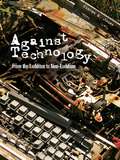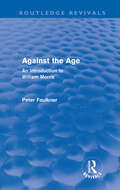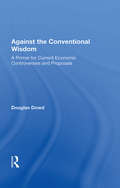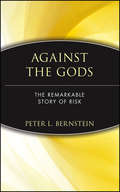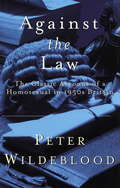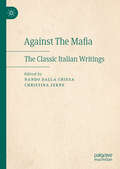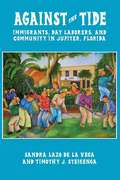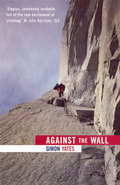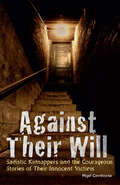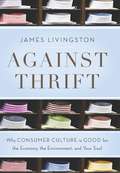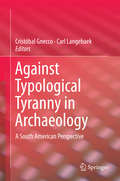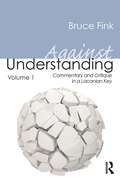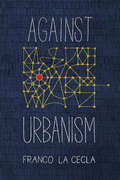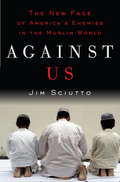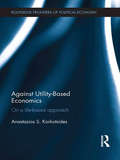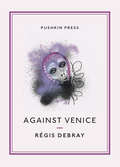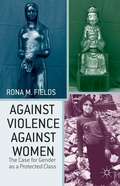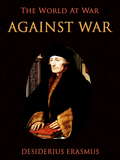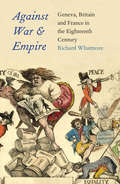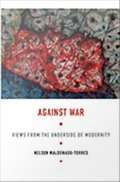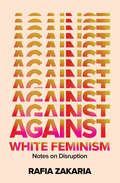- Table View
- List View
Against Technology: From the Luddites to Neo-Luddism
by Steven E. JonesThis book addresses the question of what it might mean today to be a Luddite--that is, to take a stand against technology. Steven Jones here explains the history of the Luddites, British textile works who, from around 1811, proclaimed themselves followers of "Ned Ludd" and smashed machinery they saw as threatening their trade. Against Technology is not a history of the Luddites, but a history of an idea: how the activities of a group of British workers in Yorkshire and Nottinghamshire came to stand for a global anti-technology philosophy, and how an anonymous collective movement came to be identified with an individualistic personal conviction. Angry textile workers in the early nineteenth century became romantic symbols of a desire for a simple life--certainly not the original goal of the actions for which they became famous. Against Technology is, in other words, a book about representations, about the image and the myth of the Luddites and how that myth was transformed over time into modern neo-Luddism.
Against The Age: An Introduction to William Morris (Routledge Revivals)
by Peter FaulknerStudents new to the work of William Morris will find the full range of his achievements covered in this reissue of Peter Faulkner's excellent biography, first published in 1980. The author has carefully placed Morris in the context of the Victorian age, but has also suggested the relevance of his ideas today. The six chapters are organised biographically and cover all aspects of Morris’s work in poetry, fiction, design and socialist politics. The emphasis is on his continuous struggle against the age in which he lived, seen as an idealism which went through various stages from the wistfulness of The Earthly Paradise through the practical activities of the firm of Morris & Company to the socialism of Morris's later years. The book quotes freely from writings by Morris which are not easily accessible and gives an overall account from which the student can develop his specialist interests. This reissue will appeal to sixth-formers and undergraduates interested in the Victorian period, as seen through one of its most striking personalities. When this book appeared in 1980, Morris’s reputation had risen again after the low estimates of the interwar period. This was due both to the reappraisal of his politics and to the expanding popularity of his designs. Against the Age offers a clear account of Morris’s career for those developing an interest in his numerous achievements. It covers the whole range of Morris’s work, and argues for his significance as a writer of both poetry and prose. Since 1980 our knowledge of Morris has been enriched by the publication of Norman Kelvin’s edition of his Collected Letters, by the late Nicholas Salmond’s editions of his contributions to the socialist journals, by Fiona MacCarthy’s biography of 1984, and by the increasing recognition of Morris as a pioneer of environmentalism. However, the book retains its value for its wide coverage and its balanced attitude to Morris’s achievements, and for its encouragement to readers to consider the issues that make Morris of continuing importance today.
Against The Conventional Wisdom: A Primer For Current Economic Controversies And Proposals
by Douglas DowdFor the past twenty-five years, the United States has undergone a retrogression in its socioeconomic policies–facilitated and supported by most economists–thanks to the steady drumbeat of arguments by entrepreneurs and politicians who celebrate the free market for anything and everything and who advocate, among other follies, balanced budgets and r
Against The Gods
by Peter L. BernsteinA Business Week, New York Times Business, and USA Today Bestseller "Ambitious and readable . . . an engaging introduction to the oddsmakers, whom Bernstein regards as true humanists helping to release mankind from the choke holds of superstition and fatalism. " -The New York Times "An extraordinarily entertaining and informative book. " -The Wall Street Journal "A lively panoramic book . . . Against the Gods sets up an ambitious premise and then delivers on it. " -Business Week "Deserves to be, and surely will be, widely read. " -The Economist "[A] challenging book, one that may change forever the way people think about the world. " -Worth "No one else could have written a book of such central importance with so much charm and excitement. " -Robert Heilbroner author, The Worldly Philosophers "With his wonderful knowledge of the history and current manifestations of risk, Peter Bernstein brings us Against the Gods. Nothing like it will come out of the financial world this year or ever. I speak carefully: no one should miss it. " -John Kenneth Galbraith Professor of Economics Emeritus, Harvard University In this unique exploration of the role of risk in our society, Peter Bernstein argues that the notion of bringing risk under control is one of the central ideas that distinguishes modern times from the distant past. Against the Gods chronicles the remarkable intellectual adventure that liberated humanity from oracles and soothsayers by means of the powerful tools of risk management that are available to us today. "An extremely readable history of risk. " -Barron's "Fascinating . . . this challenging volume will help you understand the uncertainties that every investor must face. " -Money "A singular achievement. " -Times Literary Supplement "There's a growing market for savants who can render the recondite intelligibly-witness Stephen Jay Gould (natural history), Oliver Sacks (disease), Richard Dawkins (heredity), James Gleick (physics), Paul Krugman (economics)-and Bernstein would mingle well in their company. " -The Australian
Against The Law
by Peter Wildeblood'This right which I claim for myself and for all those like me is the right to choose the person whom I love' Peter WildebloodIn March 1954 Peter Wildeblood, a London journalist, was one of five men charged with homosexual acts in the notorious Montagu case. Wildeblood was sentenced to eighteen months in prison, along with Lord Montagu and Major Michael Pitt-Rivers. The other two men were set free after turning Queen's Evidence.Against the Law tells the story of Wildeblood's childhood and schooldays, his war service, his career as a journalist, his arrest, trial and imprisonment, and finally his return to freedom. In its honesty and restraint it is eloquent testimony to the inhumanity of the treatment of gay men in Britain within living memory.
Against The Law
by Peter Wildeblood'This right which I claim for myself and for all those like me is the right to choose the person whom I love' Peter WildebloodIn March 1954 Peter Wildeblood, a London journalist, was one of five men charged with homosexual acts in the notorious Montagu case. Wildeblood was sentenced to eighteen months in prison, along with Lord Montagu and Major Michael Pitt-Rivers. The other two men were set free after turning Queen's Evidence.Against the Law tells the story of Wildeblood's childhood and schooldays, his war service, his career as a journalist, his arrest, trial and imprisonment, and finally his return to freedom. In its honesty and restraint it is eloquent testimony to the inhumanity of the treatment of gay men in Britain within living memory.
Against The Mafia: The Classic Italian Writings
by Nando Dalla Chiesa Christina JerneThis collection of classic texts offers a longitudinal overview of the Italian mafia through the eyes of those who have questioned it in the past 144 years. It presents English translations of the key works of, among others, judges (Giovanni Falcone), political theorists (Gaetano Mosca), trade unionists (Pio La Torre), journalists (Giuseppe Fava), generals (Carlo Alberto Dalla Chiesa), and priests (Don Diana). These critical voices have been foundational to shaping the way Italian culture, policies and legislation relate to the mafia phenomenon. They represent different political standpoints, from elitism to communism, as well as vastly different times, from post-feudalism to hyper globalization. This book offers a rare (and hitherto untranslated) insight into, not only the history of the Italian mafia and its conceptualizations, but also into the movement against the mafia, which is one of the longest lasting (and most unrecognized) European social movements. It provides a usefulhistorical archive of Italian political and sociological thought and a diversity of perspectives through which to tackle a complex and increasingly global criminological issue, making it relevant for those interested in Italian studies, political theory, sociology, criminology, legal studies, and history.
Against The Tide
by Sandra Lazo de la Vega Timothy J. SteigengaAcross the United States, the issue of immigration has generated rancorous debate and divided communities. Many states and municipalities have passed restrictive legislation that erodes any sense of community. Against the Tide tells the story of Jupiter, Florida, a coastal town of approximately 50,000 that has taken a different path. At the beginning of the twenty-first century, Jupiter was in the throes of immigration debates. A decade earlier, this small town had experienced an influx of migrants from Mexico and Guatemala. Immigrants seeking work gathered daily on one of the city s main streets, creating an ad-hoc, open-air labor market that generated complaints and health and human safety concerns. What began as a local debate rapidly escalated as Jupiter s situation was thrust into the media spotlight and attracted the attention of state and national anti-immigrant groups. But then something unexpected happened: immigrants, neighborhood residents, university faculty and students, and town representatives joined together to mediate community tensions and successfully moved the informal labor market to the new El Sol Neighborhood Resource Center. Timothy J. Steigenga, who helped found the center, and Lazo de la Vega, who organized students in support of its mission, describe how El Sol engaged the residents of Jupiter in a two-way process of immigrant integration and helped build trust on both sides. By examining one city s search for a positive public policy solution, Against the Tide offers valuable practical lessons for other communities confronting similar challenges.
Against The Wall
by Simon YatesSimon Yates is 'the one who cut the rope' in Joe Simpson's award-winning account of their epic struggle for survival in Touching the Void. Afterwards, Yates continued mountaineering on the hardest routes. Perhaps the most testing of all was one of the world's largest vertical rockfaces, the 4, 000-ft East Face of the Central Tower of Paine in Chile. Battered by ferocious storms and almost crippled with fear just below the summit, Yates and his three companions are forced into a nightmare retreat. After resting in a nearby town, they return to complete the climb, but Yates knows he still has to face one of life's greatest challenges...
Against Their Will: Sadistic Kidnappers and the Courageous Stories of Their Innocent Victims
by Nigel CawthorneDEPRAVED KIDNAPPERS, HORRIFIC ORDEALS, COURAGEOUS SURVIVORSTrue stories of twisted criminals who hold their victims in endless captivity to satisfy their perverse desires, Against Their Will is a comprehensive compendium of the most disturbing kidnappings of all time.Jaycee Lee Dugard - lived to tell the tale of her 18 years of captivity in paroled rapist Phillip Garrido's suburban backyardElizabeth Smart - bravely held on for 9 long months in a forced marriage to religious fanatic Brian David Mitchell, who repeatedly raped her in the name of GodElisabeth Fritzl - amazingly overcame 24 years trapped in a basement dungeon built especially for her by her father, JosefColleen Stan - heroically endured 7 years as a sex slave, brutally tortured with the full consent of her captor's wifeTina Marie Risico - escaped certain death at the hands of a killer by being an unwilling accomplice in other kidnappings
Against Thrift
by James LivingstonSince the financial meltdown of 2008, economists, journalists, and politicians have uniformly insisted that to restore the American Dream and renew economic growth, we need to save more and spend less. In his provocative new book, historian James Livingston-author of the classic Origins of the Federal Reserve System-breaks from the consensus to argue that underconsumption caused the current crisis and will prolong it. By viewing the Great Recession through the prism of the Great Depression, Livingston proves that private investment is not the engine of growth we assume it to be. Tax cuts for business are therefore a recipe for disaster. If our goal is to reproduce the economic growth of the postwar era, we need a redistribution of income that reduces corporate profits, raises wages, and promotes consumer spending.
Against Thrift
by James LivingstonSince the financial meltdown of 2008, economists, journalists, and politicians have uniformly insisted that to restore the American Dream and renew economic growth, we need to save more and spend less. In his provocative new book, historian James Livingston--author of the classic Origins of the Federal Reserve System--breaks from the consensus to argue that underconsumption caused the current crisis and will prolong it. By viewing the Great Recession through the prism of the Great Depression, Livingston proves that private investment is not the engine of growth we assume it to be. Tax cuts for business are therefore a recipe for disaster. If our goal is to reproduce the economic growth of the postwar era, we need a redistribution of income that reduces corporate profits, raises wages, and promotes consumer spending.
Against Typological Tyranny in Archaeology: A South American Perspective
by Cristóbal Gnecco Carl LangebaekThe papers in this book question the tyranny of typological thinking in archaeology through case studies from various South American countries (Venezuela, Colombia, Bolivia, Argentina, and Brazil) and Antarctica. They aim to show that typologies are unavoidable (they are, after all, the way to create networks that give meanings to symbols) but that their tyranny can be overcome if they are used from a critical, heuristic and non-prescriptive stance: critical because the complacent attitude towards their tyranny is replaced by a militant stance against it; heuristic because they are used as means to reach alternative and suggestive interpretations but not as ultimate and definite destinies; and non-prescriptive because instead of using them as threads to follow they are rather used as constitutive parts of more complex and connective fabrics. The papers included in the book are diverse in temporal and locational terms. They cover from so called Formative societies in lowland Venezuela to Inca-related ones in Bolivia; from the coastal shell middens of Brazil to the megalithic sculptors of SW Colombia. Yet, the papers are related. They have in common their shared rejection of established, naturalized typologies that constrain the way archaeologists see, forcing their interpretations into well known and predictable conclusions. Their imaginative interpretative proposals flee from the secure comfort of venerable typologies, many suspicious because of their association with colonial political narratives. Instead, the authors propose novel ways of dealing with archaeological data.
Against Understanding, Volume 1: Commentary and Critique in a Lacanian Key
by Bruce Fink2014 American Board & Academy of Psychoanalysis Book Prize winner for Best Anthology Against Understanding, Volume 1, explores how the process of understanding (which can be seen to be part and parcel of the Lacanian dimension of the imaginary) reduces the unfamiliar to the familiar, transforms the radically other into the same, and renders practitioners deaf to what is actually being said in the analytic setting. Running counter to the received view in virtually all of contemporary psychotherapy and psychoanalysis, Bruce Fink argues that the current obsession with understanding – on the patient’s part as well as on the clinician’s – is excessive insofar as the most essential aim of psychoanalytic treatment is change. Using numerous case studies and clinical vignettes, Fink illustrates that the ability of clinicians to detect the unconscious through slips of the tongue, slurred speech, mixed metaphors, and other instances of "misspeaking" is compromised by an emphasis on understanding the why and wherefore of patients’ symptoms and behavior patterns. He shows that the dogged search for conscious knowledge about those symptoms and patterns, by patients and practitioners alike, often thwart rather than foster change, which requires ongoing access to the unconscious and extensive work with it. In this first part of a two-volume collection of papers, many of which have never before appeared in print, Bruce Fink provides ample evidence of the curative powers of speech that operate without the need for any sort of explicit, articulated knowledge. Against Understanding, Volume 1 brings Lacanian theory alive in a way that is unique, demonstrating the therapeutic force of a technique that relies far more on the virtues of speech in the analytic setting than on a conscious realization about anything whatsoever on patients’ parts. This volume will be of interest to psychoanalysts, psychotherapists, psychiatrists, psychologists, social workers, and counselors.
Against Understanding, Volume 2: Cases and Commentary in a Lacanian Key
by Bruce FinkAgainst Understanding, Volume 2, casts a spotlight on the status of case studies in psychoanalysis, which are commonly used to illustrate clinicians’ expertise and mastery rather than patients’ actual itineraries. When a case is presented, the complex, unwieldy, and often self-contradictory material of a therapeutic trajectory is often vastly oversimplified in view of producing a linear narrative that seems perfectly to fit the parameters of a practitioner’s preferred theoretical framework. Bruce Fink attempts to eschew the appearance of "mastery" in assembling clinical material and in discussing his approach to practice and theory in the myriad case histories and vignettes included in both Volumes 1 & 2 of Against Understanding. To counterbalance the kind of paring down of material usually carried out to make cases conform to a particular paradigm, the case write-ups presented here include much of the "raw data" so often omitted: verbatim quotes from patients about their lives, backgrounds, dreams, and fantasies; and details about the many obscure, vacillating, and unruly phases of treatment. Fink hopes thereby to allow readers to form their own opinions about the well-foundedness or unsoundness of his formulations, interpretations, and interventions. This second part of a two-volume collection of papers, interviews, and case studies provides the reader with hundreds of illustrations of Lacanian theory in practice, and will be essential for psychoanalysts, psychotherapists, psychiatrists, psychologists, social workers and counselors.
Against Urbanism (Green Arcade)
by Franco La CeclaAfter demolishing the myth of the rock star architect with his book Against Architecture, Franco La Cecla now explores the decisive challenges that cities are going to have to confront in the near future. Urban planning and development has become increasingly inadequate in response to the daily realities of life in our cities. Human, economic, ethnic, and environmental factors are systematically overlooked in city planning and housing development, and anachronistic, sterile, and formalistic architecture almost invariably prevails. Never more than today has democracy played itself out in public spaces, sidewalks, and streets. Urban planners and developers, however, are still prisoners of an obsolete vision of passivity which betrays actual city needs and demands. A new urban science is required which can, first of all, guarantee a civil, dignified life for all—urban development which ensures the right to a humane mode of daily living, which has been and still is completely ignored.
Against Us: The New Face of America's Enemies in the Muslim World
by Jim Sciutto"A solid job of reporting, a personal journey of discovery, and a wake-up call for all who read it. " --Charles Gibson, ABC News. After nearly one hundred assignments for ABC News in Muslim countries, Jim Sciutto brings back this disturbing truth: the Al-Qaeda-inspired view of an evil America bent on destroying Islam has moved from the fringes to the mainstream. Sciutto profiles a cross-section of people in the Arab world, including a former Al-Qaeda jihadi turned electrician in Saudi Arabia, a Jordanian college student willing to risk his life by killing Americans in Baghdad, a Christian woman who supports Hezbollah in Lebanon, bitter pro-democracy advocates in Egypt who feel betrayed by the United States, and British-born Muslim terrorists living in London. The result is an alarming portrait of the depth and scope of anti-American sentiment. Yet there is hope for America to turn the tide of hate. Democratic ideals are still held in high esteem, even as America's perceived actions against Muslims are not, and President Obama's election has raised hopes for change among many Muslims. Against Us is an urgent wake-up call for all Americans--and in particular those charged with formulating U. S. foreign policy--to rebuild relations with the Arab world and restore confidence in American values.
Against Utility-Based Economics: On a Life-Based Approach (Routledge Frontiers of Political Economy)
by Anastasios S. KorkotsidesUtility-based theory and the fallback choice-theoretic framework are shown to be biased, irremediably flawed and misleading. A radically different theory of value and of consumer behaviour is proposed based on existential interpretations of scarcity, value and self-interest. For self-conscious mortals, only time is scarce. All other is derivative scarcity. Value is in the life, as a knowledge extract of time, which goes into commodities as direct human labour and depreciated capital, through their production. By structuring their preferences, consumers try to confiscate more of such value per unit of expended income, extending their social presence, soothing their angst and gaining power over each other. This raises output and makes gains cancel out. Negative psychological externalities preclude any well-being or social-welfare type conclusion. These resolve a number of long-standing issues: endogenously generated growth, the micro-macro connection, the price mechanism, crises, unemployment, etc. Equilibrium is of a low-potential kind, not of a force-balancing one, and it is unique, reachable and stable. The relevant analytics involve purely economic, non-psychological entities. Consumer behaviour is grounded on a well-defined, structure-based decision criterion and on observably measurable magnitudes, only. The social ramifications of the two juxtaposed perspectives are discussed at length.
Against Venice
by John Howe Regis DebrayNumerous writers have made declarations of love to cities, but Against Venice speaks not of love, but of dislike. It is a counterblast to intellectuals who regard Venice as the city where existentialism should be experienced, at parties in the palazzi of friends. Debray criticises this world in a refreshingly irreverent way, luring the traveller back to this seductive city.
Against Violence against Women
by Rona M. FieldsResponding to the targeted destruction of women, Fields argues for establishing Gender as a protected class under the Genocide Convention. Cases are explored, historically, anthropologically, psychologically and sociologically, from the author's field research, as well as focuses on morbidity, mortality and demographic documentation data.
Against War (The World At War)
by Desiderius ErasmusA classic anti-war essay from the mid-1500s. Erasmus gives elegant arguments against war from both religious (Christian) and logical (economic, practical) points of view. He seems particularly alarmed and confused by Christians fighting wars with Christians. The problem, of course, is that people waging war only consider religious or logical reasons when they are looking for excuses to wage war.
Against War and Empire
by Richard WhatmoreAs Britain and France became more powerful during the eighteenth century, small states such as Geneva could no longer stand militarily against these commercial monarchies. Furthermore, many Genevans felt that they were being drawn into a corrupt commercial world dominated by amoral aristocrats dedicated to the unprincipled pursuit of wealth. In this book Richard Whatmore presents an intellectual history of republicans who strove to ensure Geneva’s survival as an independent state. Whatmore shows how the Genevan republicans grappled with the ideas of Rousseau, Voltaire, Bentham, and others in seeking to make modern Europe safe for small states, by vanquishing the threats presented by war and by empire.
Against War with Iraq: An Anti-war Primer (Open Media Series)
by Barbara Olshansky Michael Ratner Jennie GreenDespite public outcry at home and international opposition abroad, the Bush Administration deployed troops and invested millions in preparation for a massive military assault on Iraq. In this Open Media Series special edition, three legal scholars from the Center for Constitutional Rights argue persuasively that the looming war against Iraq is both unnecessary for national security, and illegal. Against War with Iraq describes the high cost of the US war in Iraq in terms of human life, as well as the economic and political havoc it will trigger. A timely and much needed anti-war primer, Against War with Iraq contains the core facts and analysis needed to understand the issues and become an effective advocate against hawkish U.S. foreign policy.
Against War: Views from the Underside of Modernity
by Nelson Maldonado-TorresNelson Maldonado-Torres argues that European modernity has become inextricable from the experience of the warrior and conqueror. In Against War, he develops a powerful critique of modernity, and he offers a critical response combining ethics, political theory, and ideas rooted in Christian and Jewish thought. Maldonado-Torres focuses on the perspectives of those who inhabit the underside of western modernity, particularly Jewish, black, and Latin American theorists. He analyzes the works of the Jewish Lithuanian-French philosopher and religious thinker Emmanuel Levinas, the Martiniquean psychiatrist and political thinker Frantz Fanon, and the Catholic Argentinean-Mexican philosopher, historian, and theologian Enrique Dussel. Considering Levinas's critique of French liberalism and Nazi racial politics, and the links between them, Maldonado-Torres identifies a "master morality" of dominion and control at the heart of western modernity. This master morality constitutes the center of a warring paradigm that inspires and legitimizes racial policies, imperial projects, and wars of invasion. Maldonado-Torres refines the description of modernity's war paradigm and the Levinasian critique through Fanon's phenomenology of the colonized and racial self and the politics of decolonization, which he reinterprets in light of the Levinasian conception of ethics. Drawing on Dussel's genealogy of the modern imperial and warring self, Maldonado-Torres theorizes race as the naturalization of war's death ethic. He offers decolonial ethics and politics as an antidote to modernity's master morality and the paradigm of war. Against War advances the de-colonial turn, showing how theory and ethics cannot be conceived without politics, and how they all need to be oriented by the imperative of decolonization in the modern/colonial and postmodern world.
Against White Feminism: Notes On Disruption
by Rafia ZakariaA radically inclusive, intersectional, and transnational approach to the fight for women’s rights. <p><p> Upper-middle-class white women have long been heralded as “experts” on feminism. They have presided over multinational feminist organizations and written much of what we consider the feminist canon, espousing sexual liberation and satisfaction, LGBTQ inclusion, and racial solidarity, all while branding the language of the movement itself in whiteness and speaking over Black and Brown women in an effort to uphold privilege and perceived cultural superiority. An American Muslim woman, attorney, and political philosopher, Rafia Zakaria champions a reconstruction of feminism in Against White Feminism, centering women of color in this transformative overview and counter-manifesto to white feminism’s global, long-standing affinity with colonial, patriarchal, and white supremacist ideals. <p><p> Covering such ground as the legacy of the British feminist imperialist savior complex and “the colonial thesis that all reform comes from the West” to the condescension of the white feminist–led “aid industrial complex” and the conflation of sexual liberation as the “sum total of empowerment,” Zakaria follows in the tradition of intersectional feminist forebears Kimberlé Crenshaw, Adrienne Rich, and Audre Lorde. Zakaria ultimately refutes and reimagines the apolitical aspirations of white feminist empowerment in this staggering, radical critique, with Black and Brown feminist thought at the forefront.
